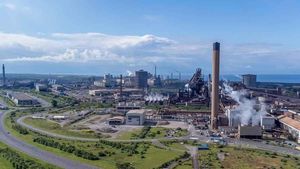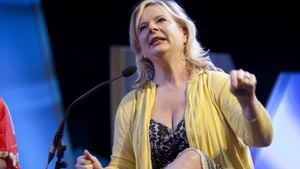Georgia has been caught up in intense protests and allegations of electoral discrepancies following the recently held parliamentary elections on October 26. The atmosphere bristled with tension when Giorgi Kalandarishvili, the head of Georgia's Central Election Commission, became the target of dissenting voices. Just as results confirming the ruling Georgian Dream party's victory were being announced, Kalandarishvili was doused with black paint by David Kirtadze, a member of the opposition United National Movement (UNM). This dramatic incident occurred during a meeting meant to validate the election outcomes and left Kalandarishvili with visible injuries, including a bandaged eye.
Outside the commission's headquarters, several hundred opposition supporters rallied, echoing calls for electoral justice as they denounced the election results which favored Georgian Dream, claiming they were tainted by rigging and unfair practices. Kalandarishvili maintained, "There is no tangible proof indicating the elections were manipulated," nor did he accept allegations of coercion and bullying during the electoral process.
The election results revealed the ruling party had captured 53.93% of the votes, securing 89 of the 150 parliamentary seats available. This outcome was overshadowed by claims of electoral fraud within the country, many of which arose from deep-seated frustrations over Georgia's drifting political alliances, particularly its perceived tilt toward Russia.
The European Union, which had previously placed great significance on these elections as indicators of Georgia's aspirations for EU membership, has called for thorough investigations amid reports of bribery, coercion, and violence affecting the election climate. Critics of the ruling party, established by billionaire Bidzina Ivanishvili, assert its governing style has become increasingly authoritarian, evoking fears of Russian influence spreading within Georgia's political environment.
President Salome Zourabichvili has publicly condemned the electoral outcomes, asserting they were influenced by Moscow, and has called for international support to the demonstrators advocating for political accountability. Meanwhile, a rallying cry for renewal echoed through Tbilisi as tens of thousands took to the streets, feeling betrayed by the electoral process. Amid these protests, students began organizing their own marches across major cities, channeling their frustrations at present leadership.
Irakli Kobakhidze, the Prime Minister and leader of the ruling party, maintained the elections were just and declared parliament preparations would proceed unhindered, disregarding calls for the president’s approval, which Zourabichvili withheld. He asserted his government would not hesitate to take action against opposition parties if they continued what he deemed unconstitutional activities, raising concerns about potential suppression of dissent.
Adding layers to the discord, another protest erupted across the separatist region of Abkhazia. There, opposition groups clashed with police concerning new legislation allowing Russian citizens to acquire property. The protests, fuelled by fears of increased Russian dominance, saw demonstrators attempting to seize control of government buildings. Abkhazian leadership under President Bzhania strained to calm tensions by offering early elections if protesters vacated the premises. Yet, demonstrators stridently refused the compromise, insisting on complete leadership transitions without conditions.
These turbulent events and the opposition's rejection of the election results illuminated the fractures within Georgia’s political system, as the country once viewed as striving for democratic reforms, grapples with growing discontent and rising influences from neighboring Russia. The consequences of these protests remain to be seen, but for now, Georgia's quest for true democratic governance appears more contested than ever.



